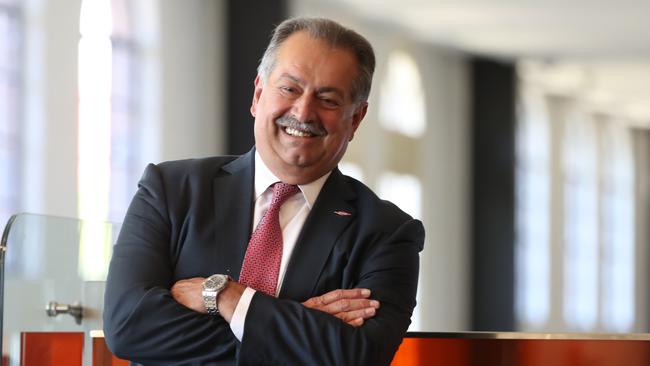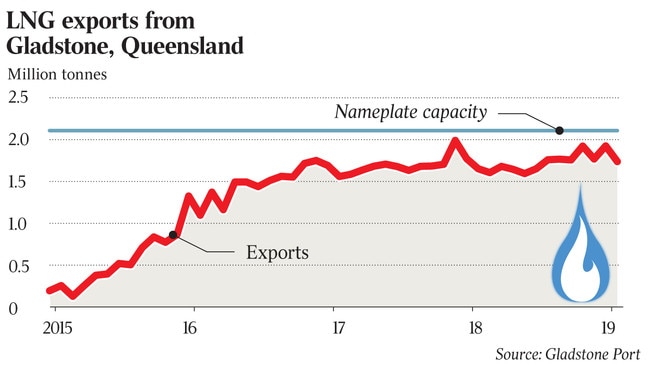Turn on the gas, Liveris urges Morrison
Former Dow Chemicals CEO says soaring cost of gas on the east coast is killing manufacturing.

Former Dow Chemicals chief executive Andrew Liveris says the soaring cost of gas on the east coast is “killing manufacturing” and has lamented Australia’s failure to compete internationally by tapping its vast natural resources.
In an interview with The Australian, Mr Liveris, who retired last year after 14 years as chief of the US-based chemicals group that became DowDuPont, said Australia had not been using its natural resources and energy to its advantage.
He urged the new Morrison government to make energy policy one of its top priorities.
“It is a tragedy that manufacturing in Australia is being hit by high electricity prices when we have abundant energy. It is a situation which should be remedied as fast as possible.”
Mr Liveris cited the potential of the Northern Territory’s Beetaloo Basin, some 500km southeast of Darwin, which was “the third-largest shale gas deposit on the planet”.
“There is a lot more gas onshore in Australia which could be produced. There is a lot of gas sitting under the ground in Australia onshore (which could be tapped by) working with state governments,” according to Mr Liveris, who is currently advising the Northern Territory government on developing its gas industry.
The Australian executive called on the federal government to consider a US-style system where natural gas is sold by a range of producers feeding into a central hub.
He criticised the current system, where two major companies supply gas to the east coast of Australia using their own pipelines.

“It’s a regulated oligopoly,” he said. “What the US does is to build pipelines which everyone can use. Companies can pay a fee, put the gas into the pipeline and send it to a hub — in the US it is called the Henry Hub and people pull the gas from there.
“The price is set on a daily basis, depending on how much demand there is.”
The federal government should encourage the construction of pipelines across Australia that could be used by all producers feeding into the hub, he said.
“We need to set up a hub and a gas trading marketplace. Once the hub is built there will be more suppliers. A lot more people will drill and we will have gas prices much more competitive than what we are paying on the east coast now.
“If you had a couple of pipelines east to west and north to south, you would start tapping all of it. You will get the small guys and the large guys (feeding into it).”
Australia’s east coast domestic gas price is now linked to international LNG prices and markets after Queensland’s three export projects started shipping local gas to customers in Asia over the past few years, which effectively tied the two markets together.
Domestic gas prices are now three to four times traditional levels, above $10 a gigajoule, which is pushing gas-dependent manufacturers to the brink as they struggle to compete with international rivals able to access cheaper energy supplies despite holding less natural resources.
The Australian Competition & Consumer Commission and major commercial users including Qenos and Brickworks have sounded the alarm on soaring energy costs. Orica is weighing the future of its Newcastle ammonia plant with up to 300 jobs at risk as the high price of gas renders its Kooragang Island facility uncompetitive, while Incitec Pivot this week called for the federal government to consider a new approach to energy policy, with its Gibson Island fertiliser plant in danger of shutting.
Mr Liveris said creating a more effective domestic gas market in Australia would help to “decarbonize our economy”.
“If we can build a competitive local gas infrastructure, break the oligopolies and get prices to the power stations down, we could put in gas turbines to replace the coal-fired turbines and retire the coal fleet and you would get the best of both worlds,” he said.
“You would get lower electricity prices, lower gas prices, you would get gas for manufacturing and get more jobs and reduce emissions.
“I would put a lot of effort into putting in the right pipeline infrastructure.”
Mr Liveris said he knew of major companies offshore which would be able to build large pipelines to transfer gas across the country if policies were suitable.
He was speaking to The Australian by phone from Japan, where he has been advising on the operation of the B20 group of business leaders who will meet around the time of the G20 leaders meeting in Osaka next month.
A former chairman of the President’s American Manufacturing Committee, he is also a director of IBM, Saudi oil giant Aramco, engineering company WorleyParsons and Brisbane-based battery technology company Novonix.
The ex-Dow boss is no longer advocating the federal government introduce a domestic gas reservation policy that would seek to restrict or ban gas exports because there had been a big increase in gas production around the world which was holding down world prices.
“Let’s leave the current exporters to do what they do,” he said.
“Gas is being discovered everywhere — in Russia, Saudi Arabia, the US and Argentina. The wave of oversupply has made the market work internationally.
“If you let the market work by having more supply, the price will remedy itself.”
Mr Liveris said he hoped the re-election of the Morrison government would mean that “Australia is in for a period of stability”.
“You really do need stable leadership and stable government.
“Business people (around the world) are screaming for consistency in policy on a variety of different areas including those which Australia has been fighting about.”
Mr Liveris said energy in Australia required government intervention.
“The energy market in Australia is not working,” he said. “Demand is being killed by high prices.
“I hope now we have a more stable Morrison government it can look at energy policy as a priority.”
Mr Liveris said he thought education should be another top priority of the Morrison government.



To join the conversation, please log in. Don't have an account? Register
Join the conversation, you are commenting as Logout